

Oxford University Department for Continuing Education. Key facts Overview Social entrepreneurs are gaining international attention motivated by the desire for change and to see the world as it can be, not as it is.
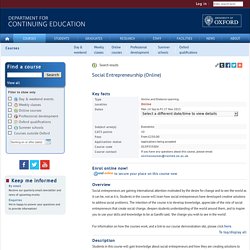
Students in the course will learn how social entrepreneurs have developed creative solutions to address social problems. The intention of the course is to develop knowledge, appreciate of the role of social entrepreneurs that create social change, deepen students understanding of the world around them, and to inspire you to use your skills and knowledge to be as Gandhi said, ‘the change you wish to see in the world’.
For information on how the courses work, and a link to our course demonstration site, please click here. Description. A Fundraising Template Every Entrepreneur Can Use. Raising massive rounds these days is so commonplace that most of us tune out fundraising news altogether.
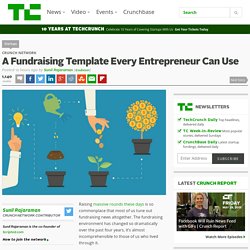
The fundraising environment has changed so dramatically over the past four years, it’s almost incomprehensible to those of us who lived through it. A lot has been made of how ridiculous late-stage rounds have gotten, as well. Bill Gurley penned one of the best pieces I’ve read on the subject recently; to raise late-stage rounds, startups go through far less diligence and scrutiny than they would if they decide to go public. As a result, a lot of late-stage startups lack the operational discipline necessary to go public. I would argue that trend trickles down all the way to the earliest stages of venture-backed companies and really starts there. Early-stage CEOs are practically taught to not even put a financial model in any of their fundraising decks until they get to their Series B.
This is not a one-size-fits-all solution. Include all of your recurring expenses, however small.
Don't believe the hype. Interesting Organization. You Can't Just Hack Your Way to Social Change - Jake Porway. By Jake Porway | 1:00 PM March 7, 2013 “We have a lot of data, but we have no idea what we should do with it.”
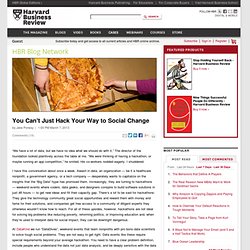
The director of the foundation looked plaintively across the table at me. “We were thinking of having a hackathon, or maybe running an app competition,” he smiled. His co-workers nodded eagerly. I shuddered. I have this conversation about once a week. At DataKind we run “DataDives”, weekend events that team nonprofits with pro bono data scientists to solve tough social problems. Any data scientist worth their salary will tell you that you should start with a question, NOT the data. Without subject matter experts available to articulate problems in advance, you get results like those from the Reinvent Green Hackathon. To avoid this problem, organizations have to be willing to put time and effort into scoping problems with the technologists ahead of time. Statisticians have long known that data analysis helps us understand our world, but never fully explains it. Untitled. Service rationing and strategic queuing – Full Contact Philanthropy.
People hate standing in line, and just about everyone in the social sector loathes having to decide who should receive a particular intervention and who should not.
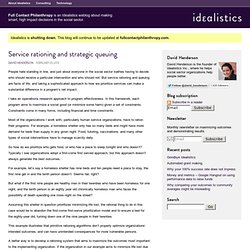
But service rationing and queuing are facts of life, and taking a sophisticated approach to how we prioritize services can make a substantial difference in a program’s net impact. I take an operations research approach to program effectiveness. In this framework, each program aims to maximize a social good (or minimize some harm) given a set of constraints. Constraints come in many forms, including financial and time constraints. Most of the organizations I work with, particularly human service organizations, have to ration their programs.
So how do we prioritize who gets food, or who has a place to sleep tonight and who doesn’t? For example, let’s say a homeless shelter has nine beds and ten people need a place to stay, the first nine get in and the tenth person doesn’t. 10 Great Social Innovation Reads: February 2013. 10 Great Social Innovation Reads: February 2013 By Nell Edgington The gloves came off in February.
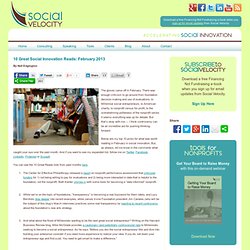
There was enough criticism to go around from foundation decision making and use of evaluations, to Millennial social entrepreneurs, to American charity, to nonprofit versus for-profit, to the overwhelming politeness of the nonprofit sector, it seems everything was up for debate. But that’s okay with me — I think controversy can be an incredible aid for pushing thinking forward.
Below are my top 10 picks for what was worth reading in February in social innovation. You can see the 10 Great Reads lists from past months here. The Center for Effective Philanthropy released a report on nonprofit performance assessment that criticized funders for 1) not being willing to pay for evaluations and 2) being more interested in data that is helpful to the foundation, not the nonprofit. Photo Credit: Tim Pierce. 30 Under 30 - Social Entrepreneurs.
Sirolli Institute Enterprise Facilitation Economic Development. Is Your Social Venture Really Worth Scaling? - Paul Bloom. By Paul Bloom | 9:17 AM August 13, 2012 Although scaling is the holy grail for most social entrepreneurs, not everyone should attempt it.

In a previous post, I outlined the key capabilities I’ve found to be present in the social ventures that are able to reach sizeable impact (which can be remembered with the acronym SCALERS—they are Staffing, Communicating, Alliance-Building, Lobbying, Earnings-Generation, Replicating, and Stimulating Market Forces). Scaling Social Impact in Six Steps.